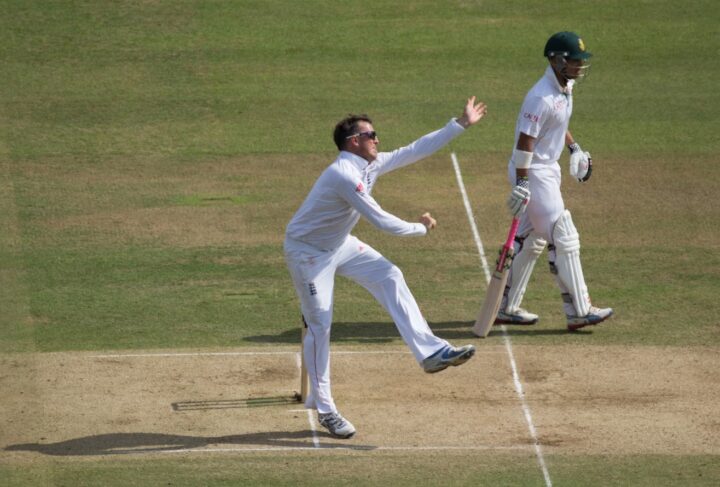Back in February, Kevin Galvin wrote about Irish cricket as his team built up to their test debut against Pakistan. Today he’s back, fresh from helping Cricket Ireland with their media duties, to tell us how it all went down at Malahide.
One sensed, when Kevin O’Brien raised his bat to acknowledge the crowd after an historic century, that Ireland’s inaugural test match against Pakistan was as much the beginning of the end, as a chance for new beginnings.
By the time England make the expected short hop over in 2020, not only will O’Brien be likely watching on from the sidelines, so will captain Porterfield, Ed Joyce, Niall O’Brien, Boyd Rankin and Tim Murtagh, with much uncertainty surrounding their replacements.
The swansong, too, of Cricket Ireland’s base at Malahide, with the club and the association unable to agree on a continuation at the North Dublin venue, with an all-purpose ground at Abbotstown sure to provide the necessary facilities, however without much of the charm.
Cricket Ireland, like their team did against Pakistan last weekend, have always ensured that even if they don’t entirely succeed, they absolutely never fail. Roadblocks and pitfalls aplenty along this rocky journey towards test status, the rightly-criticised move by the ICC to reduce their World Cup to just 10 teams yet another, but Warren Deutrom and his small staff always manage to find a way to get the job done.
For a while at Malahide – particularly as Stuart Thompson moved onto 50, supporting O’Brien with the sort of level-headedness and clear thinking that evaded Ireland in their first innings – it looked like the side were going to do the same, and become only the third test side in history to avoid defeat in their first game of the long-form (Australia’s win in the inaugural test against England, and Zimbabwe’s draw versus India in 1992 the others).
To say that plucky Ireland were gallant in defeat would be slightly patronising to this group of players, who have already achieved so much on the international stage, and would have been disappointed not to add more runs, particularly on the morning of the fifth day. However, the game has functioned to prove what the sport’s governing body have spent over a decade trying to convince the International Cricket Council, that Ireland genuinely do belong on the world test stage.
If not for O’Brien’s stoic century – which will always be the symbolic image when one looks back over these five days – then for Tim Murtagh and Boyd Rankin’s opening spells in the first and second innings, which, despite the difficult circumstances in both, managed to put serious nerves amongst a jittery Pakistan batting lineup, and had those in the stands dreaming.
Not that there were too many, but many of those that did turn up on the grounds of the famous castle, particularly over the weekend, for what was their first ever taste of live cricket, should return when England visit in 2020. World Cup successes have showed that any previous convictions go out the window when Ireland are doing well, and particularly when the English can be had!
So expect the stands – wherever they are, and in whatever form they take – come that proposed English test in 2020, to be jammed to the rafters. Following a brilliantly organised and run test by Cricket Ireland, which, despite the comparatively low numbers, produced an atmosphere at times seldom rivalled by any of the more iconic stadia around the world.
What happens now in the interim is purely guesswork, while the task at the moment surrounds Ireland’s next proposed test match, the association’s focus must remain with the limited overs game from a purely financial level, with the less-publicised T20 series against India in June set to be far more lucrative to the association then a Pakistani test which has in all likelihood run at a loss.
No World Cup spot for the first time in the 21st century means another key opportunity to project the sport into the national psyche has been lost, and while hopes are that this test is another step into securing cricket’s status among the country’s mainstream sports, Cricket Ireland’s next challenge at the ICC lobbying table is to reverse the rising tide of isolationism, in a time when other sports are desperately trying to expand around the globe.
For those ageing players, this year’s tournament was probably set to be their last in an Irish jersey. But for the next generation – from the likes of George Dockrell and Jack Tector who narrowly missed out on a test place, to the youngsters from the local primary school playing an impromptu match out the back of the Malahide Castle End – the latest battle is set to shape their future cricketing landscape, test status or no test status.
Kevin Galvin









Good to the Irish putting up a superb fight against Pakistan.
If the ECB had any idea they would introduce an annual Test between England and Ireland. I don’t hold out much hope though as the ECB seems hell bent on destroying Test cricket.
Excellent to see Ireland wearing traditional sweaters aswell not those ghastly singlet things.
I thought it was a brilliant test match, swinging backwards and forwards as proper test cricket should. Ireland might have won, but for missing a chance when Pakistan needed about 100.
There is certainly an argument that Ireland should have got test status after the 2011 world cup. However, the actions of the ICC and ECB, and the best interests of cricket, are not always identical. Going forward, you’d hope all visitors to England would play a test against Ireland, and congratulations to Pakistan for doing so.
The challenge for Ireland (in all formats of the game) is going to be to manage the transition to a younger generation of players as those who have got them to where they are now retire. If they still have a competitive team in, say, three years’ time they’ll have succeeded.
I tell you what, I suspect there’s much more good will towards Ireland among cricket fans on this side of the Irish Sea than there is for the ECB these days. At least with Test status there’ll be more national pride at stake, which will hopefully provide an incentive for young Irish players to want to represent their country instead of being drawn by the possibility of playing for England. An annual England/Ireland fixture would be a great idea, but I imsgine Graves, Harrison and Strauss would view that with about as much enthusiasm as Cricket Australia have for touring Bangladesh – and shame on them.
Ireland should sell the rights to future games to ABS (Anyone But Sky).
Ideally England and Ireland would play for some kind of trophy when they meet in 2020 (and it should then be contested at regular intervals, even if not annually). That would give the encounter a bit of context, rather than it simply being a random one-off Test. Not quite sure what the cup/trophy should be called though.
The Samuel Beckett Cup?
Good a name as any. Ireland’s wait for Test cricket to arrive must’ve felt a bit like Waiting For Godot ?
Hopefully the present aging squad will be supplemented by new talent, but unless the English County scene can be encouraged to accommodate these new players it is difficult to see how Ireland will be able to sustain test matches against the better countries. Playing the likes of Zimbabwe and Bangladesh is not going to capture the imagination or pull in the crowds. Maybe this should have happened a few years ago. The Idea of England going over to play every summer is a good one, that would certainly crete interest. However as things stand a series against the England Lions would probably be more useful in developing local talent, but it means players would have to take weeks off mid season to participate. Would the counties go for that? Certainly all the touring teams should be playing a four dayer against them, so they get some international experience every season. It is an opportunity Ireland cannot now afford to miss out on if they are to move forward.
More comedy gold from the ICC:
http://www.espncricinfo.com/story/_/id/23530870/icc-defensive-listing-dependence-india-weaknesses
Great test match but hate the ICC for reducing the number of teams in WC.